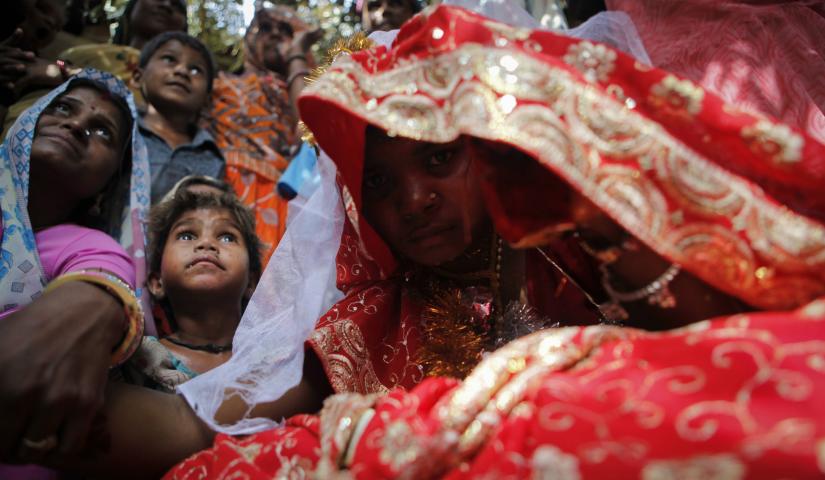 Bangladesh recorded a jump in the number of British nationals being forced into marriage against their will, latest UK government data reveals.
Bangladesh recorded a jump in the number of British nationals being forced into marriage against their will, latest UK government data reveals.
The Forced Marriage Unit (FMU), a joint Home Office and Foreign Office government body, recorded as many as 157 cases of British nationals being subjected to forced marriage linked to the “focus country” of Bangladesh in 2018. Pakistan continued to record the largest number of forced marriage cases at 769, followed by Bangladesh at 157 and India at 110 last year.
“Forced marriage is not a problem specific to one country or culture. Since 2011, the FMU has handled cases relating to over 110 countries across Asia, the Middle East, Africa, Europe and North America,” the FMU said in its 2018 analysis released last week.
The figure related to Bangladesh marks a rise from 129 in 2017 and 121 in 2016 and the breakdown found that the largest number of cases involved east London boroughs known for their large British Bangladeshi population.
“London was the region involving the largest number of reported Bangladeshi cases, with the boroughs of Newham and Tower Hamlets having the most reported cases,” states the FMU's statistical analysis.
“The age of the victim – where known – was most likely to be between 18 and 21 and between 22 and 25, with a lower proportion under 18,” it adds.
Laws making it illegal to force someone into marriage in England and Wales were introduced in 2014 and anyone found guilty of the crime can be jailed for up to seven years.
In 2018, the FMU said it gave advice or support related to a possible forced marriage in 1,764 cases. These figures include contact that was made to the FMU in relation to a new case through its public helpline or by email and general inquires. The majority of cases (75 per cent) involved women but a number of men also approached the unit for help.
“In 2018, 119 cases (7 per cent) had no overseas element, with the potential or actual forced marriage taking place entirely within the UK. This is a decrease compared with previous years, but continues to highlight that forced marriages can take place in the UK,” the FMU said.
A forced marriage is defined as one in which one or both spouses do not (or, in the case of some adults with learning or physical disabilities or mental incapacity, cannot) consent to the marriage, and violence, threats, or any other form of coercion is involved. Coercion may include emotional force, physical force or the threat of it, and financial pressure, the FMU advice notes.
It differentiates itself from an arranged marriage, in which both parties have consented to the union but can still refuse to marry if they choose to.
As well as a legal ban, British police also has the power to issue Forced Marriage Protection Orders to help potential victims. Any breach of such an order is punishable by imprisonment.
 Others
Others
31024 hour(s) 17 minute(s) ago ;
Morning 11:11 ; Wednesday ; May 01, 2024
Bangladesh registers hike in forced marriage cases in UK
Send
Aditi Khanna, London
Published : 02:00, May 29, 2019 | Updated : 02:00, May 29, 2019
Published : 02:00, May 29, 2019 | Updated : 02:00, May 29, 2019
0 ...0 ...
/hb/
Topics: Top Stories
- KOICA donates medical supplies to BSMMU
- 5 more flights to take back British nationals to London
- Covid19: Rajarbagh, Mohammadpur worst affected
- Momen joins UN solidarity song over COVID-19 combat
- Covid-19: OIC to hold special meeting
- WFP begins food distribution in Cox’s Bazar
- WFP begins food distribution in Cox’s Bazar
- 290 return home to Australia
- Third charter flight for US citizens to return home
- Dhaka proposes to postpone D8 Summit
Unauthorized use of news, image, information, etc published by Bangla Tribune is punishable by copyright law. Appropriate legal steps will be taken by the management against any person or body that infringes those laws.
Bangla Tribune is one of the most revered online newspapers in Bangladesh, due to its reputation of neutral coverage and incisive analysis.
F R Tower, 8/C Panthapath, Shukrabad, Dhaka-1207 | Phone: 58151324; 58151326, Fax: 58151329 | Mob: 01730794527, 01730794528


